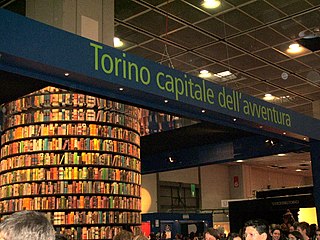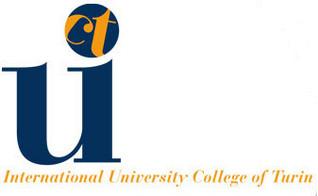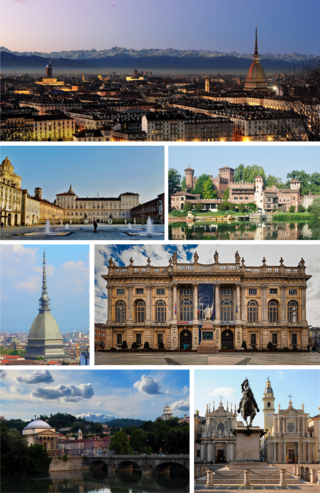
Piedmont, located in northwest Italy, is one of the 20 regions of Italy. It borders the Liguria region to the south, the Lombardy and Emilia-Romagna regions to the east, and the Aosta Valley region to the northwest.

Slow Food is an organization that promotes local food and traditional cooking. It was founded by Carlo Petrini in Italy in 1986 and has since spread worldwide. Promoted as an alternative to fast food, it strives to preserve traditional and regional cuisine and encourages farming of plants, seeds, and livestock characteristic of the local ecosystem. It promotes local small businesses and sustainable foods. It also focuses on food quality, rather than quantity. It was the first established part of the broader slow movement. It speaks out against overproduction and food waste. It sees globalization as a process in which small and local farmers and food producers should be simultaneously protected from and included in the global food system.

Terra Madre is a network of food communities. Terra Madre network was launched by the Slow Food grass roots organization, and the intent is to provide small-scale farmers, breeders, fishers and food artisans whose approach to food production protects the environment and communities. The network brings them together with academics, cooks, consumers and youth groups so that they can join forces in working to improve the food system.

The University of Gastronomic Sciences (UNISG) is an international university located in northern Italy. The campus is in Pollenzo, near Bra, a city in the north-west region of Piedmont. Carlo Petrini, founder of the Slow Food Movement, established the university to focus on gastronomic sciences and the organic relationships between food, ecology, and cultures. More than 2,500 students have taken courses at UNISG since it opened in 2004. UNISG offers a variety of courses leading to undergraduate and graduate degrees in areas related to gastronomic sciences, food cultures and heritage, food ecologies, and food communications and management. As part of their curriculum, students every year are engaged in a number of field study trips in Italy and also in other European and extra-European countries.

The Milan Furniture Fair is a furniture fair held annually in Milan. It is the largest trade fair of its kind in the world. The exhibition showcases the latest in furniture and design from countries around the world. It is considered a leading venue for the display of new products by designers of furniture, lighting and other home furnishings. The show, also known as "Salone", "Milano Salone" and "Milan Design Week", is held every year, usually in April, in the FieraMilano complex in the Milan metropolitan area town of Rho. Besides the Salone, in April every odd year Euroluce exhibition takes place and every even year EuroCucina and the International Bathroom Exhibition are held along the Milan Furniture Fair.

The Turin International Book Fair is Italy's largest trade fair for books, held annually in mid-May in Turin, Italy.
The Turin Motor Show was an auto show held annually in Turin, Italy. The first official show took place between 21 and 24 April 1900, at the Castle of Valentino, becoming a permanent fixture in Turin from 1938 having shared it with Milan and Rome until that time. From 1972, the show was held biannually and in 1984, it moved into Fiat's shuttered Lingotto factory.

The International University College of Turin, or IUC Turin, is an independent University founded in 2006 with a grant from the Compagnia di San Paolo and Consiglio Nazionale del Notariato. Teaching at IUC focuses on the interdisciplinary and critical study of law, economics and finance. The IUC is located in the center of the city of Turin, Italy. The Founding President of IUC is Franzo Grande Stevens. Stefano Rodotà served as President until 2014. The current President is Edoardo Reviglio.

The Palace of Venaria is a former royal residence and gardens located in Venaria Reale, near Turin in the Piedmont region in northern Italy. It is one of the Residences of the Royal House of Savoy, included in the UNESCO Heritage List in 1997.

Turin is a city and an important business and cultural centre in Northern Italy. It is the capital city of Piedmont and of the Metropolitan City of Turin, and was the first Italian capital from 1861 to 1865. The city is mainly on the western bank of the Po River, below its Susa Valley, and is surrounded by the western Alpine arch and Superga hill. The population of the city proper is 843,514, while the population of the urban area is estimated by Eurostat to be 1.7 million inhabitants. The Turin metropolitan area is estimated by the OECD to have a population of 2.2 million.

Eataly is a chain of large format/footprint Italian marketplaces comprising a variety of restaurants, food and beverage counters, bakery, retail items, and a cooking school. Eataly was founded by Oscar Farinetti, an entrepreneur formerly involved in the consumer electronics business, and collaborates with Slow Food.
The following is a timeline of the history of the city of Turin, Piedmont, Italy.
Eric Pateman is a Canadian chef, entrepreneur and consultant in the food and aviation industries. He currently serves as the Chief Experience Officer & VP, Passenger Experience, at Vancouver International Airport (YVR). Pateman owned and operated the Edible Canada brand of companies, which included restaurant, retail, and culinary travel divisions, until its closure in 2021. He is also the Executive Chef and President at Sea to Sky Seasonings, which produces the Amola salt line. He provides culinary consulting services to businesses in the public and private sector around the world through his consulting firm ESP Culinary Consulting.

Gigi Padovani is an Italian journalist. He has worked as a reporter for La Stampa for many years, writing articles on domestic politics and society as well as collaborating with other newspapers and magazines. An essayist and food writer, he has published about twenty books, some of which have been translated into other languages. His publications include: Nutella: Un mito italiano (2004), Slow Food Revolution: A New Culture for Dining and Living (2006), and Street food all'italiana with his wife Clara Vada Padovani (2013).

The following outline is provided as an overview of and topical guide to Turin:

Lorighittas are a type of pasta typical of the village of Morgongiori at the foot of Monte Arci in Sardinia. They are recognized as a traditional food and thus carry the P.A.T. label in Italy.
Chiara Sacchi is an Argentinian climate activist from Buenos Aires.
Brian Yazzie, known as Yazzie the Chef is a Navajo chef. He celebrates and promotes Indigenous American foods.
Jamila Norman is a first generation American, born in New York to Caribbean parents. She grew up in Queens, New York, then eventually moved, with her family, to Connecticut, and finally to Georgia. Her mother grew up on a family farm in Jamaica, and her father is from Trinidad. She earned a bachelor's degree in Environmental Engineering from the University of Georgia. She is a mother and currently lives in Atlanta, Georgia.















